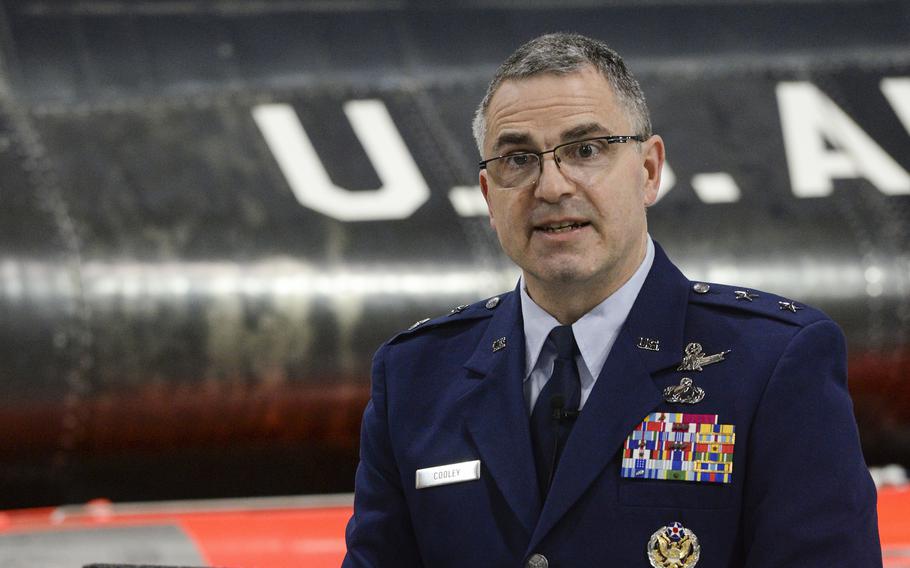
Maj. Gen. William Cooley speaks in April 2019 at the National Museum of the United States Air Force, Wright-Patterson Air Force Base, Ohio. Cooley will be the first Air Force general officer to face court-martial on a sexual assault charge, officials said. Wesley Farnsworth/U.S. Air Force (Wesley Farnsworth)
The unprecedented court-martial of an Air Force general for sex offenses is spurring debate among legal experts about the wider significance of the case for the military.
Maj. Gen. William Cooley, the former head of the Air Force Research Laboratory, was referred for court-martial in April based on accusations that he groped and kissed a civilian woman in 2018.
Cooley will be tried on a charge of sexual assault. He denies the allegation.
It is the first time in the service's 74-year history that it has prosecuted a general officer for such alleged misconduct.
The proceedings could stem from politics, a societal evolution, progress in military justice or all three, analysts said.
"It's a recognition that sexual assault is a serious crime, and that in and of itself is an evolution," said Rachel E. VanLandingham, a former Air Force judge advocate and professor at the Southwestern Law School. "Twenty years ago, those kinds of things were just dismissed out of hand."
Victor Hansen, a former Army lawyer who represented dozens of senior officers facing noncriminal investigations and now teaches at New England Law, agreed that the charge against Cooley reflects a shift in perception.
Society has become more aware of the extent of sexual assault and harassment and more willing to condemn it, Hansen said.
"The military is not immune from the pressures of that reality," he said. "This is evidence of a changed environment."
But Hansen also suggested a political motive.
"The Air Force is not willing to take another black eye from Congress by appearing to sweep this under the rug," he said.
The death last year of Army Spc. Vanessa Guillen, who was sexually harassed by a supervisor before being killed by a fellow soldier on base at Fort Hood, Texas, was also a crystalizing factor, experts said.
A follow-up report on the case described persistent deficiencies at the base in pre-emption of and response to sexual assault and harassment.
"The Fort Hood report was so damning," said Don Christensen, a retired chief Air Force prosecutor who is now president of Protect Our Defenders, a nonprofit organization working to reduce rape and sexual assault in the military and support survivors.
Christensen said that in recent years, reports of sexual abuse throughout the military have increased but prosecutions have declined. In fiscal year 2020, 5,600 reports resulted in only 250 courts-martial, and just 50 ended in a conviction for a sex offense, he said.
In the past, senior officers who were accused of or committed sexual misconduct, including sexual assault, were allowed to quietly retire, if the case was investigated at all.
"It's been a two-tiered justice system for generals and admirals in which they're never held to account," Christensen said.
One of Hansen's clients recently returned from an Iraq deployment with an alcohol problem and sexually assaulted several women, including a major, at a party.
"He just fell off the rails, basically groping everyone around," Hansen said. Officials, he said, "weren't even considering a court-martial."
The half-dozen general officers Hansen represented over two years in inspector general investigations had engaged mostly in what were deemed consensual sexual affairs with civilians, subordinates or subordinates' spouses.
"The dynamic I often saw, there's a hubris that goes along with this," Hansen said. "It turns out you are the man, and in some it creates a sense of entitlement: 'I've sacrificed. I deserve this.'"
Cooley’s court-martial, convened by Gen. Arnold W. Bunch Jr., head of the Air Force Materiel Command, also won’t forestall the 200 or so commanders like Bunch from soon losing that convening power, experts said.
"That ship has sailed," VanLandingham said.
The Military Justice Improvement and Increasing Prevention Act would shift the decision to prosecute rape, sexual assault and other felonies from the chain of command to military prosecutors.
It has garnered support from 66 Senate co-sponsors, as well as President Joe Biden and Defense Secretary Lloyd Austin, although there is some dispute whether to include other nonsexual felonies.
"They've lost," Christensen said of commanders, who for decades insisted that they must make prosecution decisions or lose viability. "It's only a question of how much they've lost. There is going to be major reform."
VanLandingham said Cooley's court-martial signifies that the era of impunity is over and could deter senior officers from abusing their position.
However, Hansen doubts that much will change as a result of the court-martial.
"It’s not like these folks don’t know that this conduct is a crime and at a minimum career-ending, so it's hard to see how a court-martial would provide additional deterrence," he said. "This court-martial is for public and congressional consumption."